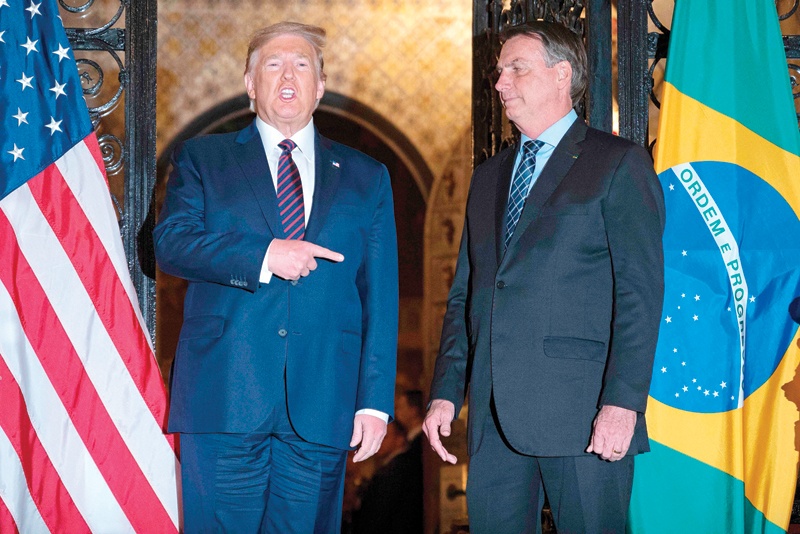 PALM BEACH, Florida: In this file photo taken on March 7, 2020, US President Donald Trump speaks with Brazilian President Jair Bolsonaro at Mar-a-Lago. - AFP
PALM BEACH, Florida: In this file photo taken on March 7, 2020, US President Donald Trump speaks with Brazilian President Jair Bolsonaro at Mar-a-Lago. - AFPBRASILIA, Brazil: When Jair Bolsonaro became Brazil's president in January 2019 he nurtured relationships with other like-minded, far-right governments, but as the political tide turns he now finds himself and his country increasingly isolated. Boasting close ties with US President Donald Trump, Bolsonaro was emboldened and unapologetic for a worldview often criticized as sexist, racist and homophobic, as well as his disdain for the environment.
But two years later Argentina has replaced the market-friendly Mauricio Macri with center-left President Alberto Fernandez, while in the United States Democrat Joe Biden will succeed Republican Donald Trump as president next week. Yet Bolsonaro, often dubbed the "Tropical Trump", shows few signs of caring.
'Ever more isolated'
The Brazilian president remains unwavering in his support for neoliberal economic policies, social conservatism and provocative anti-establishment rhetoric. Diplomatically he's pushing Brazil ever further from its main economic partners: China, the United States, the European Union, and Argentina. "This aggressive stance against everything" aimed at "mobilizing his internal base" for his 2022 re-election bid will lead him down a blind alley, says Oliver Stuenkel, a professor in international relations at the Getulio Vargas Foundation.
"In the long term this stance won't work because Brazil will become ever more isolated and it will take years for Brazil to recover its influence," he said. Bolsonaro was the last major world leader to congratulate Biden on his election victory more than a month after the event, and has backed Trump's unsubstantiated claims of electoral fraud.
"Bolsonaro needs external politics to convince his base that he's not a traditional politician" since "he can no longer present himself as the person who's going to end corruption or old school politics" now that he's made overtures to traditional political parties, said Stuenkel. Bolsonaro has alienated China over his threat to exclude Huawei from the race to develop 5G in the country, and for disparaging remarks about the Chinese Coronavac COVID-19 vaccine.
His reputation among many EU countries and the incoming Biden administration has been tarnished by his poor record on containing deforestation and wildfires in the Amazon rainforest, as well as his threat to scupper the EU's trade deal with the South American MERCOSUR bloc. And just last week he hit out at neighbor Argentina for legalizing abortion - a bill that was supported by Fernandez. He said "the lives of Argentine children" were being extinguished "with State consent."
'Deranged Quixotes'
In a Cabinet meeting in April, Foreign Minister Ernesto Araujo, who has often spoken out against globalization, said he was convinced that Brazil could be sitting "at the table of the four, five or six countries that will define the new world order" post COVID.
That seems like a far cry in a country that has suffered more than 200,000 COVID-19 deaths - second only to the United States - and whose citizens are still waiting for details on how and when a mass immunization plan will begin. "None of what they announced, such as the renewal, Venezuela, the alliance with the United States, the democracy league to defeat communism. All of these stupid ideological things ... they haven't done any of them," diplomat Paulo Roberto de Almeida told AFP.
The former director of the foreign ministry's investigative institute of international relations, who was fired in 2019, likened Bolsonaro and his top officials to "deranged Don Quijotes" tilting at "all those windmills". So far, Bolsonaro's rhetoric hasn't translated into commercial reprisals, including from China, which purchases a third of the South American giant's exports, primarily soybean and iron ore.
But the agricultural sector has repeatedly expressed concern, such as when Bolsonaro followed Trump's lead in transferring Brazil's embassy in Israel from Tel Aviv to Jerusalem, at the risk of angering Arab countries that buy huge quantities of Brazilian meat. "The question is whether Biden and the European Union will cooperate to put pressure on Brazil over the environment," said Stuenkel. "If that happens, there's a real risk to the Brazilian economy because there could be a boycott or economic sanctions." - AFP










